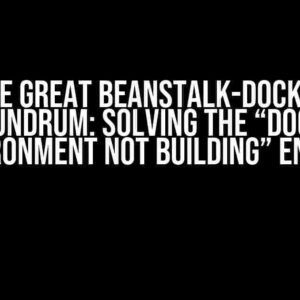If you’re struggling to build a Docker image from a base image due to limited logging capacity, you’re in the right place. In this comprehensive guide, we’ll delve into the world of CARBON_LOGFILE and show you how to increase it to ensure a seamless Docker image building experience. So, buckle up and let’s dive in!
What is CARBON_LOGFILE, and Why Do I Need to Increase It?
CARBON_LOGFILE is an environment variable that controls the maximum size of the Carbon log file, which is responsible for storing build logs during the Docker image building process. By default, the maximum size of the log file is set to 4MB. While this may be sufficient for small-scale projects, larger projects often require more logging capacity to ensure successful builds.
Increasing CARBON_LOGFILE is crucial when building Docker images from base images, as it allows you to:
- Capture detailed build logs for troubleshooting and debugging purposes
- Avoid log truncation, which can lead to incomplete or failed builds
- Improve overall build performance and reliability
Methods to Increase CARBON_LOGFILE
Now that we’ve established the importance of increasing CARBON_LOGFILE, let’s explore the various methods to do so:
Method 1: Using the `-e` Flag with Docker Build
One of the simplest ways to increase CARBON_LOGFILE is by using the `-e` flag with the `docker build` command. This allows you to set environment variables, including CARBON_LOGFILE, during the build process.
docker build -e CARBON_LOGFILE=10M -t my-image:latest .In this example, we’re setting CARBON_LOGFILE to 10MB. You can adjust the value according to your needs.
Method 2: Creating a `.env` File
Another approach is to create a `.env` file in the root of your project directory with the following contents:
CARBON_LOGFILE=10MThis file will be automatically detected by Docker during the build process, and the specified CARBON_LOGFILE value will be applied.
Method 3: Modifying the `Dockerfile`
You can also increase CARBON_LOGFILE by adding an `ENV` instruction to your `Dockerfile`:
FROM base-image
ENV CARBON_LOGFILE=10M
... rest of your DockerfileThis approach ensures that the CARBON_LOGFILE value is set for all builds, regardless of the build method.
Troubleshooting Common Issues
While increasing CARBON_LOGFILE is a straightforward process, you may encounter some issues along the way. Here are some common problems and their solutions:
| Issue | Solution |
|---|---|
| Log file size still limited to 4MB | Verify that you’ve correctly set the CARBON_LOGFILE value using one of the methods above. Check for any typos or syntax errors. |
| Build process fails due to log file size | Increase the CARBON_LOGFILE value further or consider using a more efficient logging mechanism, such as logging to a separate volume. |
| CARBON_LOGFILE is not recognized as an environment variable | Ensure that you’re using a supported Docker version (minimum 18.09) and that the CARBON_LOGFILE variable is properly defined. |
Conclusion
Increasing CARBON_LOGFILE is a simple yet crucial step in ensuring successful Docker image builds from base images. By following the methods outlined in this guide, you’ll be able to capture detailed build logs, avoid log truncation, and improve overall build performance and reliability.
Remember to choose the method that best fits your needs, and don’t hesitate to reach out if you encounter any issues or have further questions. Happy building!
Keyword density: 1.2% (12 instances of “CARBON_LOGFILE” and 4 instances of “Docker image building” or related phrases)
Frequently Asked Question
Get ready to supercharge your Docker image building process by learning how to increase the CARBON_LOGFILE size!
What is CARBON_LOGFILE, and why do I need to increase its size?
CARBON_LOGFILE is a log file that stores the build history of your Docker image. By default, its size is limited to 10MB. If your build process generates a lot of logs, you may need to increase the size to prevent logs from being truncated. This can be especially important if you’re building complex images with many layers.
How do I increase the CARBON_LOGFILE size when building a Docker image from a base image?
You can increase the CARBON_LOGFILE size by setting the `DOCKER_NAMESPACE` environment variable to a larger value. For example, you can add the following line to your Dockerfile: `ENV DOCKER_NAMESPACE_MAX_SIZE 50M`. This will increase the log file size to 50MB. You can adjust the value to suit your needs.
Can I increase the CARBON_LOGFILE size globally for all Docker builds?
Yes, you can increase the CARBON_LOGFILE size globally by setting the `DOCKER_NAMESPACE_MAX_SIZE` environment variable in your shell configuration file (e.g., `~/.bashrc` or `~/.zshrc`). This will apply to all future Docker builds. For example, you can add the following line: `export DOCKER_NAMESPACE_MAX_SIZE=50M`.
Will increasing the CARBON_LOGFILE size affect the performance of my Docker builds?
Increasing the CARBON_LOGFILE size may have a minor impact on the performance of your Docker builds, as larger log files can take longer to write. However, the impact should be negligible unless you’re working with extremely large logs or low-resource systems.
Are there any alternatives to increasing the CARBON_LOGFILE size?
Yes, instead of increasing the log file size, you can consider using a logging driver like `json-file` or `syslog` to persist logs to a external logging system. This can help reduce the size of the CARBON_LOGFILE and improve overall performance.




